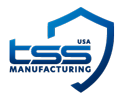TSS USA Manufacturing is proud to produce and install high-frequency filters in the United States. These products work in mitigating threats from high-altitude electromagnetic pulse (HEMP) events, which has been recognized as a major national security vulnerability.
Because of this fact, high-frequency filter solutions are strictly regulated — much like munitions or other military hardware, even though their end use may be for civilian purposes. Sales of filters from TSS USA Manufacturing must be reviewed by the government to assure the transactions are in compliance with the International Traffic in Arms Regulations (ITAR).
ITAR is relevant in this realm due to the sensitive nature of HEMP-related technologies, their potential dual-use applications, and the national security implications associated with the equipment’s development, distribution, and export.
Foreign and Domestic
HEMP events pose a significant threat to critical infrastructure, including electric grids, data centers, and network communications, by inducing harmful currents and increasing voltages. High-frequency filters serve as a vital component in mitigating the impact of HEMP events by attenuating and redirecting HEMP-induced currents, thus ensuring uninterrupted operations.
However, the implementation of such filters must adhere to ITAR regulations to conform with national security interests and prevent unauthorized access, proliferation, and misuse of sensitive technologies.
This means that even if an installation of TSS filters lies within the United States and is intended for civilian purposes, ITAR regulation still applies. The compliance process is to ensure that domestic civilian customers will not transfer the technology out of the country for use by foreign militaries.
Defense Applications
ITAR regulations control the export and import of defense-related items, including technologies specifically designed or modified for military applications. High-frequency filters used in HEMP mitigation fall within the scope of ITAR as they possess dual-use potential, meaning they can be employed for both civilian and military purposes.
ITAR compliance ensures that the development and deployment of high-frequency filters align with the rigorous controls and restrictions imposed by the United States government.
HEMP mitigation technologies are classified as defense articles under ITAR, which means they are subject to stringent export controls. Compliance with ITAR regulations ensures that the distribution and export of high-frequency filters are monitored, preventing the unauthorized transfer of critical technologies to foreign entities or individuals who may use them for malicious purposes or compromise national security.
Protection of Intellectual Property
Besides security concerns, ITAR compliance also plays a vital role in protecting intellectual property (IP).
The development of high-frequency filters often involves significant research, innovation, and investment, resulting in valuable IP rights. ITAR regulations help to preserve the rights of proprietary technologies by regulating access to sensitive information and preventing unauthorized disclosure or exploitation.
By enforcing strict controls on technology transfers, ITAR ensures that U.S. companies like TSS retain their competitive edge and the ability to leverage their expertise in HEMP mitigation.
Close Collaboration
ITAR compliance enhances national security by fostering closer collaboration and information sharing among government agencies, defense contractors, and research institutions. ITAR regulations mandate that organizations involved in the development and deployment of defense-related technologies establish robust security measures, including access controls, training programs, and risk assessments.
Compliance with these regulations promotes a culture of security and ensures that organizations involved in HEMP mitigation adhere to stringent protocols designed to protect sensitive information and prevent unauthorized access.
Technical Review
Furthermore, ITAR compliance supports the advancement of high-frequency filter technologies through the necessary regulatory oversight and certification processes. ITAR regulations require the establishment of comprehensive compliance programs, which involve thorough reviews, audits, and documentation of technology development, manufacturing, and distribution processes.
These processes help verify the reliability, effectiveness, and quality of high-frequency filters, ensuring that they meet stringent standards and perform optimally in HEMP mitigation scenarios.
High Frequency Filters from a Trusted Source
By adhering to ITAR requirements, TSS USA Manufacturing offers reassurance to its clients that its engineering solutions can uphold the highest standards of security, reliability, and effectiveness, thereby contributing to the resilience and electromagnetic compatibility of critical infrastructure.
For more on ITAR rules and the consequences of noncompliance, download TSS USA Manufacturing’s ITAR compliance whitepaper.




